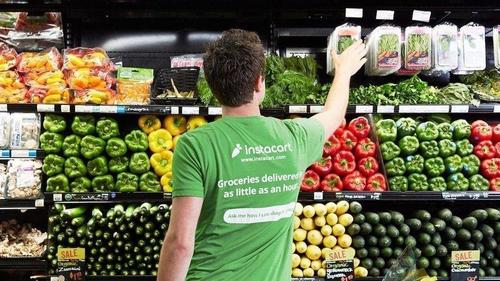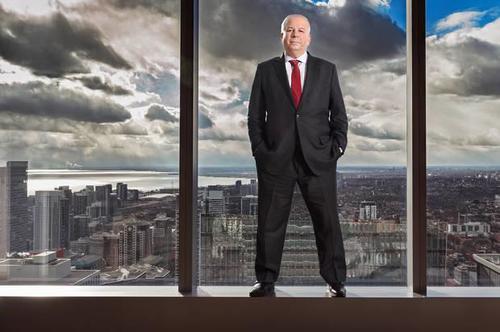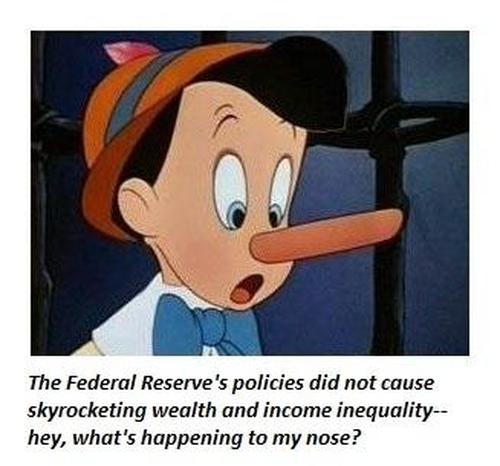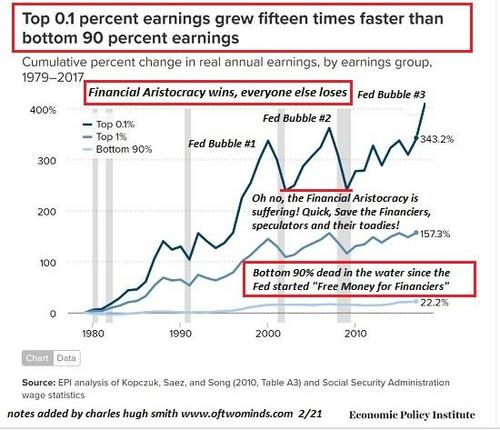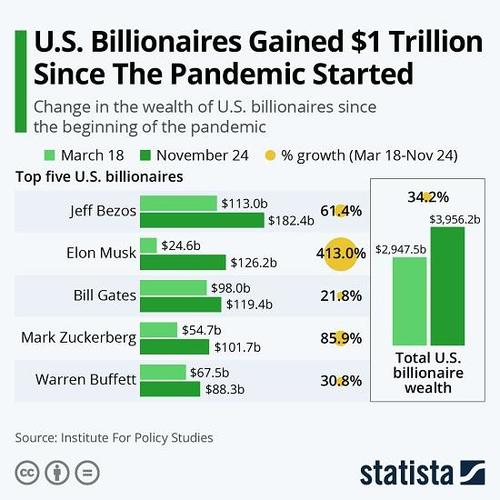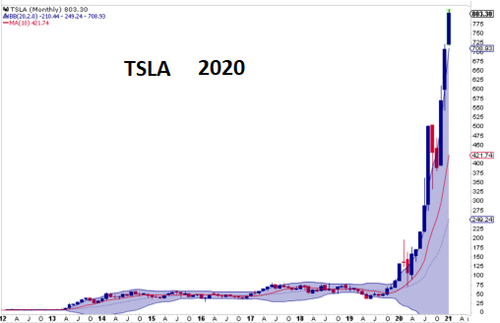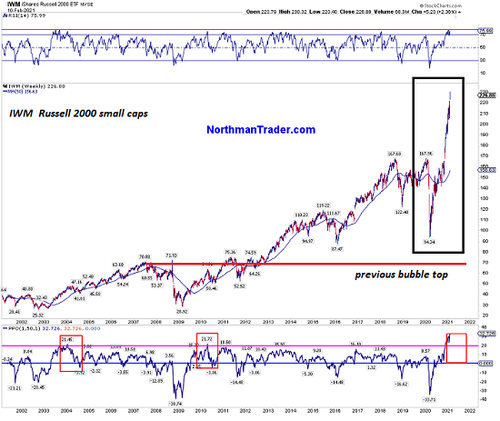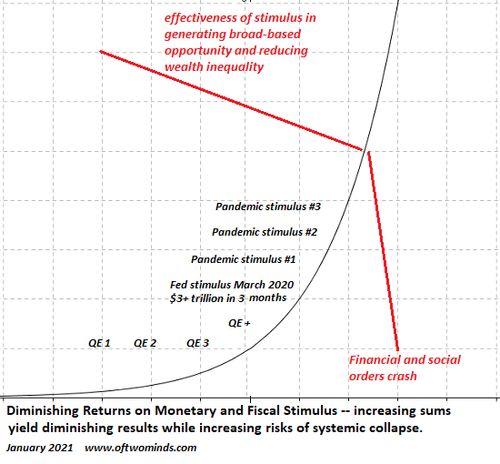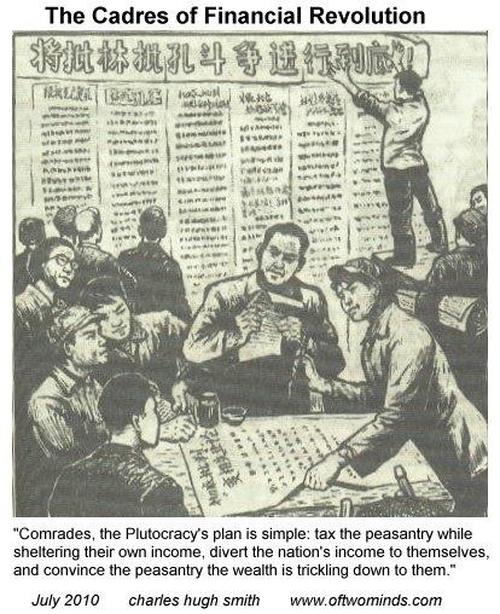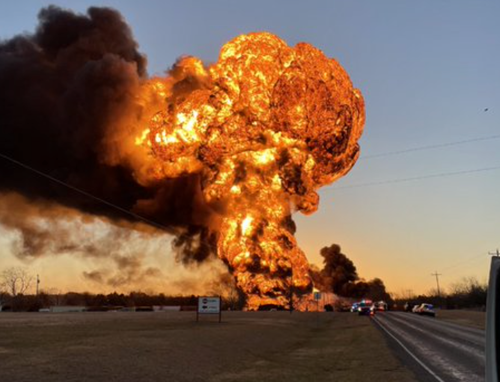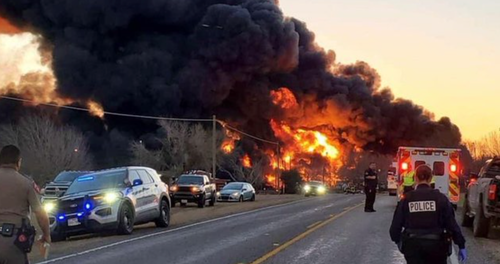When Short-Selling Is Done Right
Authored by Doug Kass via Seabreeze Partners,
-
Short selling is risky
-
Most individual investors would be better off to avoid short selling
-
The academic evidence on the effects of short selling on our capital markets is overwhelmingly positive
-
Short selling improves the efficiency of security prices, increases liquidity, and positively impacts corporate governance
* * *
“We don’t like trading agony for money”
Charlie Munger (in his response to my question when I was the “credential bear” at the 2013 Berkshire Annual Meeting)
Short selling is a risky investment strategy where the investor profits if the stock price drops.
Let’s start with the reasons why most retail investors should not sell short as an offensive (and non arbitrage) strategy:
1. The gravitational pull of stocks is higher over time. On average, equities return about six to seven percent per year. So, bull markets are a far more frequent condition than bear markets.
2. The reward v. risk in short sales is asymmetric. One can only make 100% on a short, but, in theory, the upside is infinite. (For example, GameStop rose from $20/share to $480/share. Compare that percentage rise to the percentage decline opportunity if GME had gone bankrupt!)
3. If a long goes against you (as the shares decline in price) the position becomes a smaller portion of your portfolio. However, if a short goes against you (as the shares rise in price) the position becomes a larger portion of your portfolio.
4. Shorts are taxed adversely relative to longs. Longs sold after twelve months are eligible for long term capital gain tax rates. If you hold a short for five years and then cover for a profit – the gain is taxed as a short term gain.
Also consider that “everyone” is against a short — current stock owners, managements, Wall Street sell-side research, investment banks (trying to sell stock to the public), commercial bankers (who are hoping investment banks succeed in raising capital, thereby reducing their lending risk) and, even, governments which prefer higher stock prices in order to receive higher tax revenues.
The media doesn’t understand it. Even Congress doesn’t get it. After the Game Stop hearings the only conclusions reached were that there should be more restrictions on short sellers even though the shorts were the victims. That’s just crazy. Nobody in the hearings focused on how much the manipulative longs made and the pain THEY inflicted on the public. The financial media doesnt get it either. For every “short and distort” story, there are literally hundreds of fabricated touts lacking any real analytical basis .
The above factors help to explain why short selling is so difficult and why most should not sell short. It requires a great deal of “supervision” of positions and price discipline.
I have the investment scars on my back from my personal experiences in short selling when I was a “yute.” As a result, I have developed some specific techniques to increase the odds of a profitable short. Let’s briefly examine my core tenets in shorting:
-
Avoid shorting valuation. It is my experience that even the stocks with the richest valuations tend to get even richer valuations.
-
Instead, find stocks to short whose business landscape (and potential sales/profits) are deteriorating cyclically or secularly relative to consensus expectations.
-
Do not short stocks with high short interest relative to the share float (total outstanding shares less insider holdings) or relative to daily average trading volume. In the main, I steer clear of shorts that represent over seven or eight percent of the float and when short interest represents more than seven or eight days of trading.
-
Short sellers should have stops and risk parameters set before the trade goes on.
-
In shorting, err on the side of conservatism.
-
On average, short position sizes should be smaller than long position sizes.
-
Short position sizes should be weighed against one’s risk appetite and profile.
Market Benefits of Short Selling
Short selling confers a number of benefits both directly to the capital markets themselves and indirectly to the real economy. Theoretical, academic and empirical studies have shown that short selling improves overall market quality by contributing to price efficiency, improves liquidity, and has corporate governance benefits. (Historical bans and restrictions on short selling have proved to negate many of these benefits, to the detriment of overall market quality).
Pricing Efficiency
Short selling contributes to the accuracy, efficiency and natural discovery of prices in securities markets, primarily by ensuring that both positive and negative public information about firms are promptly reflected in prices. The 2013 Boehmer and Wu study examined the speed with which public information is incorporated into stock prices, finding that more active short selling leads to faster incorporation of information into prices.
Improving Liquidity
Short selling also positively impacts overall market quality through improvements in market liquidity. A 2013 Beber and Pagano study examined the liquidity impacts of short selling bans across 30 countries, finding a decline in liquidity when shorting constraints are more severe.
Short selling helps the market to function more smoothly and efficiently. For example, short selling allows a market maker, hedge fund or liquidity provider to hedge options, swaps, futures, ETFs, etc. This generally results in improved liquidity, tighter spreads between bids and offers and (de facto) in lower effective trading costs.
Corporate Governance Benefits
Short selling also contributes positively to strong corporate governance by serving as an external disciplining mechanism on firm management. In theory, since short sellers are motivated to uncover wrongdoing by management (and then trade on that information through short sales), the probability and speed with which corporate misconduct is discovered increase. As a result, there is less incentive for management to engage in such misconduct, thus improving the corporate governance of the firm. A 2015 Massa and Zhang study examined the corporate governance impact of short selling – finding that the presence of short sellers does indeed improve the behavior of firm managers.
Some of the greatest examples of corporate malfeasance and frauds have been discovered by short sellers. Baldwin United, Enron and Lernout & Hauspie are very good examples.
Shorting Strategies
There are many bonafide reasons to sell short away from an aggressive strategy to profit from lower stock prices.
For example, there are numerous hedge fund strategies that profitably incorporate short selling – arbitrage, long/short, etc.
However, most large investors now tend to avoid (non arbitrage) short selling because its hard to short in scale. Melvin Capital’s experience with GameStop will likely further dampen the interest of large hedge funds from short selling.
Given the longer term trend that stocks climb over time, it should be clear that long buying generates wealth. By contrast, I consider short selling as a means of protecting wealth.
I use both Index ETFs and individual shorts in my approach to managing money – but almost always stick to my basic core short tenets (above).
Most individual investors, if they short at all, should probably stick to Index ETFs – which are liquid and diversified and not subject to short squeezes (as seen recently in Tilray, GameStop and AMC).
Until recently, longs and shorts have operated on an uneven playing field as the large majority of Wall Street sell-side research has been historically geared towards long buys (and not sales/shorts). As well, the financial media is geared towards buying not selling or shorting. However, with the broad expansion of social media outlets, this is changing and the field is growing more even.
Finally, it is my experience that when we compare fundamental long buyers to fundamental short sellers — short sellers tend to be somewhat more informed and rigorous in their analysis. Given today’s dominance of passive over active investing, market participants today are less educated about fundamentals than in the past and more educated in price (momentum). This has, in my view, created an unusual opportunity for short sellers who are willing to brave the formidable headwinds discussed above.
Tyler Durden
Tue, 02/23/2021 – 12:14
via ZeroHedge News https://ift.tt/2ZJjjDe Tyler Durden
